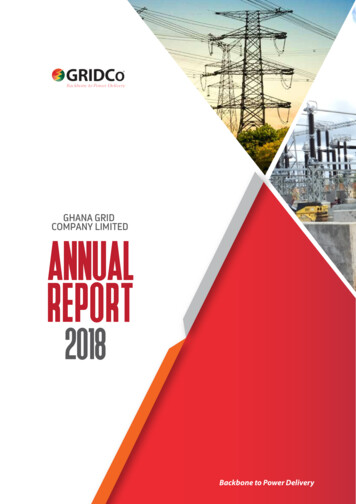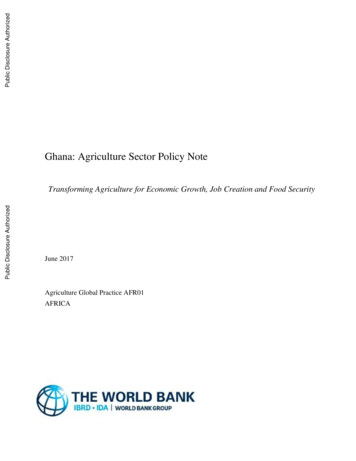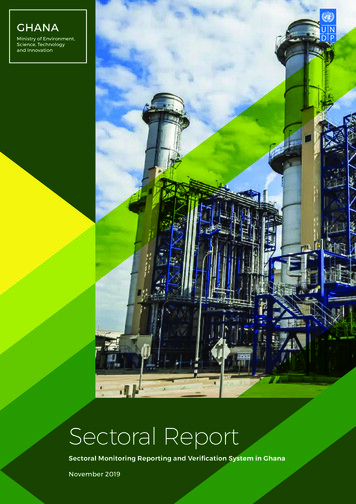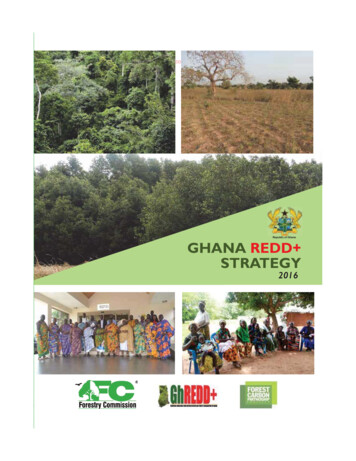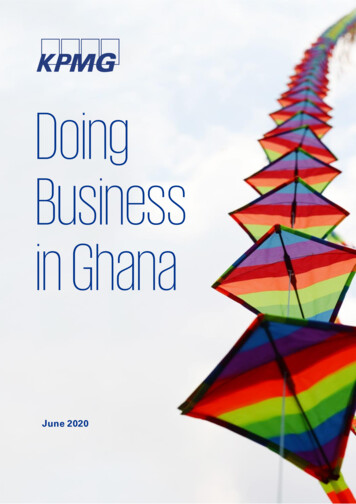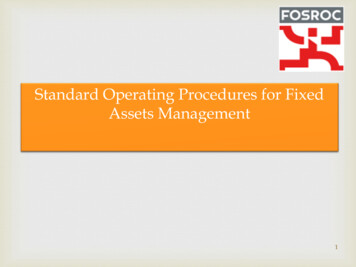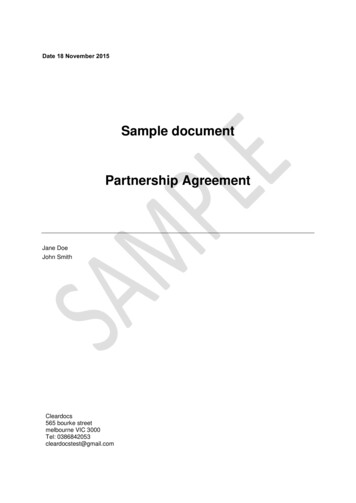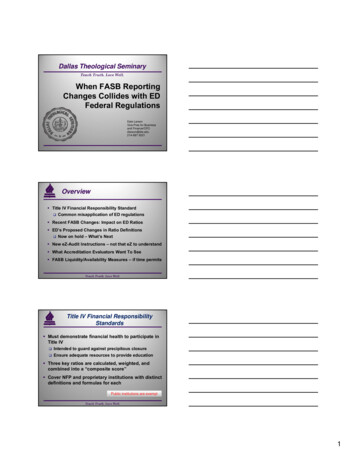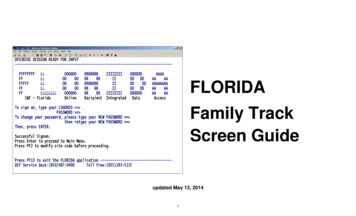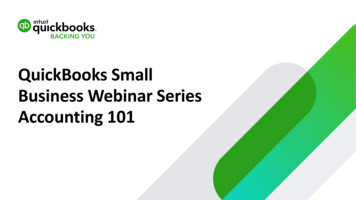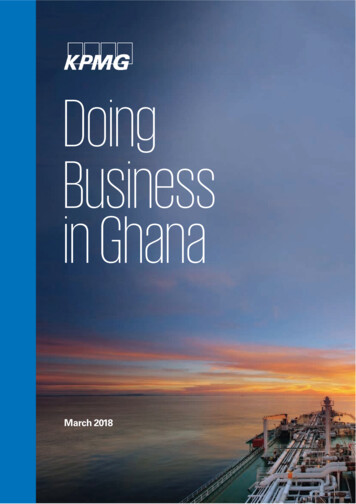
Transcription
DoingBusinessin GhanaMarch 2018
Table of ContentsAbout Ghana0304Modern Ghana takes its namefrom the ancient kingdom ofGhana which was situated some800 km.07Legal Framework12Tax System18The government is committed toimplementing policies that reducethe general cost of doing businessin GhanaThe tax types that investors willencounter in Ghana areCorporate Tax, WithholdingAppendix ARegistrationof Business23Appendix BGhana TaxData Cards 2018 KPMG, a partnership registered under Ghanaian law and a member firm of the KPMG networkof independent member firms affiliated with KPMG International Cooperative ("KPMGInternational”),a Swiss entity. All rights reserved.2
Appendix B- Tax Data CardsContentA.B.C.D.Corporate Income Tax RatesLocation IncentivesFree Zone EnterpriseGains on Realisation of Assets or Liabilities and Gifts ReceivedE.Unrelieved Losses from Business or InvestmentF.Temporary Tax ConcessionsG.H.Additional Deduction for Companies that Employ Fresh GraduatesI.Withholding Tax Rates (Residents)J.Withholding Tax Rates (Non-Residents)K.Individual Income Tax RatesL.Personal ReliefsCapital AllowancesM.N.O.Benefits-in-KindP.Value Added TaxQ.R.S.T.U.V.Mortgage DeductionDouble Tax TreatiesNational Health Insurance LevyOvertimeBonusTaxCalendarRoyaltiesSpecial Taxes 2018 KPMG, a partnership registered under Ghanaian law and a member firm of the KPMG networkof independent member firms affiliated with KPMG International Cooperative ("KPMGInternational”),a Swiss entity. All rights reserved.3
AboutGhana 2018 KPMG, a partnership registered under Ghanaian law and a member firm of the KPMGnetwork of independent member firms affiliated with KPMG International Cooperative ("“KPMGInternational”),a Swiss entity. All rights reserved.
Ghana lies at the heart of aregion which has been leadingSub-Saharan African culture sincethe first millennium BC in metalworking mining, sculpture andagriculture. In 1951, the GoldCoast became the first Britishcolony in Africa to achieve selfgovernment and upon attainingpolitical independence in 1957, itbecame known as Ghana.The Volta Lake formed after damming the river isnavigable for a distance of about 400 km andmotorised vessels now ply its waters carryingpassengers and goods from the south of thecountry to the north and vice versa. There areseveral rivers in the country and the mostimportant is the Volta dammed at Akosombo,Akuse and Bui (situated on the Black Volta) forhydro- electric power generation plants.Other rivers are the Pra, Ankobra and Tano. Amongthe smaller rivers are the Densu and Ayensu whichprovide Winneba and parts of the capital, Accra,with pipe-borne water. The largest natural lake inthe country is Bosomtwi with a total area of 48square kilometres and reaches depths of 72 metersin some parts.PopulationLocationModern Ghana takes its name from the ancientkingdom of Ghana which was situated some 800 km.(500 miles) to the north of present-day Accra, whichflourished up to the eleventh century AD. Ghana lies onLatitude 5 degrees, 36 minutes north and Longitude 0degrees, 10 minutes east. To the west of Ghana liesCôte d’Ivoire, to the east Togo, to the north, BurkinaFaso and to the south is the Gulf of Guinea. TheGreenwich Meridian passes through Tema near Accramaking Ghana geographically the closest to the centreof the world, that is, the notional point of intersectionbetween the equator and longitude zero degree (0degree) which is located in the Atlantic Ocean at about614km from Accra.ClimateThe climate is mainly tropical. There are two mainseasons; the wet and the dry seasons. NorthernGhana experiences its rainy season from March toNovember while the south, including the capitalAccra, experiences that season from April to midNovember.As of 1 January 2017, the population of Ghana wasestimated to be 28,409,576 people and increase of 2.39 %(663,411 people) compared to population of 27,746,165 in2016. The sex ratio of the total population was 1.036(1,036 males per 1 000 females) which is higher thanglobal sex ratio.Thirty-six and half percent of the population is under15years, 60% of the population is between 16-65years and 3.6 percent is above65.It is estimated that between now and 2020 thenumber of children under 15 (now nearly eightmillion) will remain virtually constant while the 15 to64 year age group will nearly double to 18 million;there will also be a substantial increase in the elderlypopulation (65 and over), to over one million, but thatproportion of the total population will still be small.Ethnic GroupsVegetationGhana is home to more than 100 different ethnicgroups. The official language is English; however, mostGhanaians also speak at least one local language.DrainageThe ethnic groups in Ghana are the Akan (the Fante,Akyem, Ashanti, Kwahu, Akuapem, Nzema, Bono,Akwamu, Ahanta and others) 47.3 %; Mole-Dagbani16.6%; Ewe 13.9 %; Ga-Dangme ( Ga, Dangme) 7.4%;Guan 3.7%; Gurma 3.7%; Grusi 2.5%; Mande 1.1%;other tribes 1.4%; other (Hausa, Zabarema, Fulani)0.4% (2010 census). The religious distribution isfollows: Christianity 71.2% (Pentecostal/Charismatic28.3%, Protestant 18.4%, Catholic 13.1%, other11.4%),Islam 17.6%, Traditionalist 5.2%, and noaffiliation 5.3%, none 0.7% (2010census).Ghana has tropical vegetation of dense tropical rainforest in the southern middle belt. The vegetationcover is evergreen forest with semi deciduous forestat the northern and southern fringes. Towards thenorth is savannah grassland and towards the coast isthe coastal savannah.There are a few mountains and several hills rising to aheight of 900 meters and above. Mount Afadzato isthe highest mountain and lies 1,500 meters above sealevel.The country is drained by a large number of streams andrivers. The Volta River and its tributaries drain more thantwo-thirds of water bodies in the country. All the majorrivers in the country flow into the Gulf of Guinea directlyor as tributaries to other major rivers. The Akosombo andBui Dams, both built on the Volta River, provideshydro-electricity for Ghana. 2018 KPMG, a partnership registered under Ghanaian law and a member firm of the KPMG networkof independent member firms affiliated with KPMG International Cooperative ("“KPMGInternational”),a Swiss entity. All rights reserved.5
EducationMost Ghanaians have relatively easy access to primaryand secondary education. Free secondary educationwas introduced in September 2017.Ghana’s spending on education has varied between 28percent and 40 percent of its annual budget in the pastdecade. All teaching and learning is done in English,Ghana’s official language.Under the educational reforms implemented in1987,the basic education system of Ghana comprisesa six-year primary education system which usuallybegins at the age of six and a three-year junior highschool education system. A three-year senior highschool system follows after the end of the basiceducation.At the end of the third year of the junior high school,students sit for the Basic Education CertificateExamination (BECE) organised by the West AfricanExaminations Council (WAEC). Those continuing mustcomplete the three-year senior high school (SHS) ortechnical/vocational programme. Successful studentscan continue to the tertiary institutions, either to theuniversities, polytechnics, nursing training colleges orthe teacher colleges of education.GovernmentThe system of government practised in Ghana isParliamentary democracy with separation of powersamong the Executive, the Legislature and the Judiciaryguaranteed under the 1992 Constitution. The pressenjoys a great deal of freedom which has beennurtured intoone of the most vibrant in Africa. The 1992 Constitutionprovides checks and balances which limit the powersof each of the arms of government.The Constitution also provides for a Council of State,made up of experienced elders with proven character, toadvise the President on national issues. The Constitutionhas also established a number of autonomousinstitutions suchas the Commission for Human Rights and AdministrativeJustice (CHRAJ), the Electoral Commission (EC) andEconomic and Organised Crime Office (EOCO). Theseinstitutions are there to facilitate good governance. TheGovernment is elected by universal adult suffrage. Therehave been six democratically elected presidents andparliaments since itan, municipalities and district assemblies(MMDAs).Decentralisation of governmental powers to the MMDAshas been vigorously pursued for some time now and theprocess still continues.JudiciaryThe legal system is based on the English common lawand customary laws of Ghana. The court system is madeup of the Supreme Court of Ghana, Court of Appeal andthe High Court of Justice which constitute the superiorcourts. Below these are the Magistrate, Circuit andDistrict Courts, and family tribunals which constitute thelower courts. The traditional rulers also settle disputesamong their subjects but such decisions do notconstitute judgment of a court of competentjurisdiction. The 1992 Constitution which is the basiclaw of the land guarantees an independent judiciary.The tribunals which used to be part of the court systemare being phased out.Membership with otherorganisationsGhana is a member of many international organisationsincluding the United National, International MonetaryFund, World Trade Organisation, South Atlantic PeaceCooperation Zone, the Commonwealth of Nations, theEconomic Community of West African States, theAfrican Union, the United Nations, the Non-AlignedMovement, and an Associate Member of LaFrancophone. Ghana is an observer to the organisationof American States and has a strong record ofcontributing troops to international peace keepingforces.EconomyThe services sector is the biggest contributor to GDPaccounting for 57%, followed by Industry with 24% andAgriculture with 19%.The industry sector recorded the highest growth of11.5%, compared to 1.8% in 2016, mainly from miningand petroleum. The agriculture sector grew by 7.6%, upfrom 5% the previous year, driven by good performancesin the crops, fisheries, and cocoa sub-sectors. Growth inthe services sector slowed to 3.7% from 6.6%, due toslower growth in information, communication, andfinance.Outstanding credit to the private sector grew by 16.2%in May 2017, against 10.1% for the same period in2016.Ghana’s near term economic prospects are good asevidenced by the half-year fiscal performance,though global interest rate hikes are likely to impacthigh domestic and external financing costs. OverallGDP is projected to rebound to 6.1% in 2017 andthis is expected to be driven mainly by oilproduction.Ghana is considered a beacon of hope for black Africa asit continues to champion the course of good governanceas well as pursuing sound economic management. 2018 KPMG, a partnership registered under Ghanaian law and a member firm of the KPMG networkof independent member firms affiliated with KPMG International Cooperative ("“KPMGInternational”),a Swiss entity. All rights reserved.6
Investmentand LegalFramework
Investment andLegal FrameworkWhy Do Business in Ghana?The government is committed to implementing policiesthat reduce the general cost of doing business in Ghanaand to promote investor confidence in the country.With a stable multi-party government that iscommitted to market liberalisation, Ghana has beenranked as one of the most attractive locations for doingbusiness in Africa. Other factors that make Ghana acompetitive investment destination include: A sound macroeconomic environmentImmediate access to all markets of the EconomicCommunity of West African States (ECOWAS)100% foreign ownership is permittedOn-going privatisation in key economic sectorsOn-going infrastructure developmentExpanding stock marketCompetitive labour forceAvailability of skilled and trainable labourQuota-Free access to USA & European Unionmarkets.Export-free zones where goods traded with othercountries are exempt from customs duties andsome lawsFast developing financial infrastructureHigh degree of personal safety andWarm and friendly peopleStarting a Business in GhanaProcess, Time and CostDomestic LawsLaws governing the establishment of business inGhana are in accordance with the provisions made inthe following legal legislations: The Companies Code, 1963 (Act 179) The Incorporated Private Partnership Act, 1962(Act 152) The Business Name Act, 1962 (Act 151)The investor, whether Ghanaian or a foreigner, whodesires to establish a resident business entity has toregister with the Registrar General’s Department (RGD).This registration may be done under one of the Actsmentioned above, except where the entity is to operatein the country as a representative of a non-residentbusiness entity. Non-resident business entities do notgo through the process of incorporation under Act 179but simply submits the required documents to theRegistrar General who registers them in the register ofexternal companies.Investment LegislationThe legal framework for investment in Ghana isregulated by different agencies in the country.These are: Registrar General’sDepartment Ghana Investment Promotion Centre(GIPC) Ghana Immigration Service(GIS) Ghana Revenue Authority(GRA) Environmental Protection Agency(EPA) Ghana Free ZonesBoard PetroleumCommission Minerals Commission.Investment ProceduresThe first step for an investor wishing to invest in Ghanais to register with the Registrar General’s Department.The department charges a fee of 0.5% of thecompany’s stated capital. The official processing timevaries between three to five days, after which thecompany will receive the certificate of incorporationand certificate to commence business.After incorporation, companies that are partly or fullyowned by foreigners have to register with the GIPC.Registration is completed after companies have metthe minimum equity requirements depending ontheir structure as shown below.The required equity can be brought into Ghana either inmoney or in kind (goods, plant and machinery, vehicles orother tangible assets). Money can be brought in cash ortransferred into the account of the incorporated company ata Ghanaian commercial bank. The bank must confirm thetransfer to the Bank of Ghana, which subsequently informsthe GIPC. Equity in kind are generally supported by relevantdocuments such as bills of lading, invoices and others andare generally confirmed by the Customs Division of GhanaRevenue Authority prior to being presented to the GhanaInvestment Promotion Centre.Registrar General’s DepartmentThe Registrar General’s Department is theorganisation that registers all companies, societiesand institutions in Ghana and issues certificates ofincorporation and to commence business to newlyformed companies.For more information please see attached appendix1 (Registration of Business). 2018 KPMG, a partnership registered under Ghanaian law and a member firm of the KPMG networkof independent member firms affiliated with KPMG International Cooperative ("“KPMGInternational”),a Swiss entity. All rights reserved.08
Ghana Investment Promotion Centre(GIPC)The Ghana Investment Promotion Centre was set up toinitiate and maintain a favourable environment for bothGhanaian and foreign investments in Ghana. The GIPCwas established under the GIPC Act as the governmentagency responsible for overseeing investments in allsectors of the economy except mining, petroleum,free zones and portfolio investments. Investments inthe mining and petroleum sectors are licensed by theMinerals Commission and the Petroleum Commissionrespectively while that for Export Processing andportfolio investments are administered by the GhanaFree Zones Board and Ghana Stock Exchange.Ghana Immigration ServiceGhana Immigration Service is the governmentalauthority that grants work and/or residence permit. Italso handles re-entry visas, extension of visitors permitand visa on arrival to visitors in Ghana where there is noGhanaian Embassy or consulate abroad.Ghana Revenue Authority (GRA)The Ghana Revenue Authority is the agencyresponsible for administering all the tax laws in Ghana.Hitherto, revenue collection in the country was doneunder the Internal Revenue Service (IRS), Value AddedTax Service (VATS) and the Customs Excise andPreventive Service (CEPS). These agencies operatedas autonomous bodies with a Revenue GoverningAgency Board playingmonitoring and supervisory roles. Currently, all theabove agencies have been merged into one bodycalled the Ghana Revenue Authority (GRA). The GhanaRevenue Authority has three divisions, namely,Domestic Tax Revenue Division, Customs Division,and the Support Services Division.The Customs Division is responsible for collectingcustoms and excise duties whereas the Domestic TaxRevenue Division takes care of income tax, valueadded tax and national insurance levy. The SupportServices Division is responsible for all internalfunctions such as finance and administration, legal,human resource, etc. of the Authority. Each of thethree divisions is headed by a Commissioner whoreports to the Commissioner- General.Any investor in Ghana will necessarily have to registerat one of the GRA offices to pay one tax type oranother.Environmental Protection Agency(EPA)The Environmental Protection Agency is the bodyresponsible for issuing environmental permits tocompanies operating in various fields. The investorwill often be required to submit an environmentalimpact assessment report.Free Zones BoardThe Ghana Investment Promotion Centre keeps trackof all investments in the country while the Ghana FreeZones Board regulates enterprises that operate in theFree Zone enclave. These enterprises are required toexport at least 70 percent of their products and shouldbe registered as free zone enterprises.Any investor who will be producing to export at least 70percent of its total output can take advantage of the FreeZones Act and locate their businesses within the Free ZoneEnclaves at Tema or Sekondi. Boankra in the Ashanti Regionis being developed as a third free zone enclave. Registrationfor the free zone enclave generally happens after goingthrough the registration processes described above andhaving the relevant applications to be a free zone enterpriseapproved by the Free Zones Board.Some of the privileges available to free zone enterprises arethe exemption from tax on imports into the free zone as wellas exemptions from duty and other taxes on exports toforeign countries. Free zone enterprises are exempt fromcorporate income tax for a period of ten (10) years, andthereafter, the corporate tax shall be 15 percent and 25percent on income from sales to foreign markets (export) andthe local market respectively.Depending on the field of operation, additionalregistration may be necessary with otherregulatory bodies.Petroleum CommissionThis is a body set up under the PetroleumCommission Act, 2011 (Act 821), to regulate andmanage the utilisation of petroleum resources and toco-ordinate policies in relation to them.The Petroleum Commission has thefollowing responsibilities, among others: Recommending to the Minister responsible forpetroleum national policies relating topetroleum activitiesMonitoring petroleum activities and carryingout relevant inspections and audits related tosuch activitiesReceiving applications and issuing permits for 2018 KPMG, a partnership registered under Ghanaian law and a member firm of the KPMG networkof independent member firms affiliated with KPMG International Cooperative ("“KPMGInternational”),a Swiss entity. All rights reserved.9
specific petroleum activities as required underrelevant petroleum laws and regulations Promoting local content and local participation inpetroleum activities as prescribed in theLegislative Instrument (L.I 2204) and otherapplicable laws and regulations to strengthennational development, etc.Commission Act, 1993 (Act 450) as the mainpromotional and regulatory body for the mineralssector. The Commission is responsible for regulatingand managing the utilisation of the mineral resources inthe country and implementing policies relating tomining. It also has responsibility for ensuringcompliance with the various minerals and mining laws.Ghana National Petroleum Corporation(GNPC)Investors seeking to invest in the minerals sector haveto register with the Minerals Commission aftercompleting the necessary registration or incorporationrequirements at the Registrar General’s Department.The Ghana National Petroleum Corporation wasestablished by the Ghana National PetroleumCorporation Act, 1983 (PNDCL 64).MandateGNPC was established as a state-owned entity andgiven legal backing “to undertake the exploration,development, production and disposal of petroleum”.The PNDCL 84 establishes the legal frameworkgoverning the contractual relationship between thestate, GNPC and prospective investors in upstreampetroleum operations.The Corporation was established with thefollowing objects: To accelerate the promotion of petroleumexploration activities to ensure early commercialdiscovery and productionTo undertake the appraisal of existing petroleumdiscoveries to ensure production to meet nationalrequirementsTo ensure that Ghana obtains the greatest possiblebenefits from the development of its petroleumresourcesTo obtain the effective transfer to Ghana ofappropriate technology relating to petroleumoperationsTo ensure the training of citizens of Ghana and thedevelopment of national capabilities in all aspects ofpetroleum operations, andTo ensure that petroleum operations are conductedin such a manner as to prevent adverse effects onthe environment, resources and people of Ghana.National Petroleum Authority (NPA)The National Petroleum Authority is responsible forregulating the downstream petroleum industry inGhana. As a Regulator, the Authority ensures that theindustry remains efficient, profitable, fair, and at thesame time, ensures that consumers receive value formoney.Downstream activities include importation and refiningof crude oil, sale, marketing and distribution of refinedpetroleum products in the country, exportation, reexportation, shipment, transportation, processing,refining, storage, distribution, marketing and sale ofpetroleum products.Its responsibilities include issuing licenses to PetroleumServices Providers (PSPs), monitoring of the operationsof PSPs and inspecting facilities of PSPs in thedownstream industry.The NPA also ensures the quality design, constructionand operation of all petroleum infrastructure and thatconsumers receive high quality fuel that is safe,efficient and value for money.Other responsibilities include ensuring adequatemaintenance of petroleum and fair pricing of products.For more information on the NPA and licensing feesvisit their website at www.npa.gov.gh/With the establishment of the Petroleum Commission,GNPC ceased to exercise the advisory functionsrelating to the regulation, management and utilisationof petroleum resources and the coordination of policyin relation to that function.Minerals CommissionThis is a government agency established underArticle 269 of the 1992 Constitution and theMinerals 2018 KPMG, a partnership registered under Ghanaian law and a member firm of the KPMG networkof independent member firms affiliated with KPMG International Cooperative ("“KPMGInternational”),a Swiss entity. All rights reserved.10
ExpatriatesForeign investors are given immigrant quotas dependingon the level of equity capital invested in the business.However, there are opportunities to apply for increasesin automatic quota depending on one’s circumstances.After registration with the GIPC, companies can applyfor immigrant quotas.The table below shows the amount of capitalagainst which automatic quota can be obtained:Paid Up Capital and Related Quota of Expatriate StaffPaid Up Capital Required (US )50,000 - 250,000Quota of ExpatriateStaff1250,000 -500,0002500,000 - 700,0003700,000 4Investment Incentives and GuaranteesInvestment incentives are used by the government toattract investors to sectors of the economy thatrequire stimulation to grow. Some geographical areasof the country are also targeted for investments togenerate employment. Such incentives are found invarious legislations such as the GIPC Act, Free ZonesAct, and the Petroleum and Mining Laws. Investmentincentives can also be found in the revenue laws.The GIPC Act protects the businesses of investorsfrom nationalisation or appropriation by anygovernment. Where such a step has to be taken, it canonly be done by law and should be in the nationalinterest. In such a case, adequate compensation willbe paid. No individual can also be compelled to cedehis interest in any investment to any other person.Transfer of profits, interests or dividends from theseinvestment are also guaranteed by the GIPC Act. 2018 KPMG, a partnership registered under Ghanaian law and a member firm of the KPMG networkof independent member firms affiliated with KPMG International Cooperative ("“KPMGInternational”),a Swiss entity. All rights reserved.11
TaxSystem
TaxSystemGhana Revenue AuthorityThe tax types that investors will encounter in Ghana areCorporate Tax, Withholding Tax, Value Added Tax,National Health Insurance Levy, Employment Tax,Dividend Tax, Customs and Excise Duties andCommunication Service Tax.Corporate TaxThe general corporate income tax is twenty-five percent(25%). Companies in the mining sector have a corporatetax rate of thirty-five percent (35%), while those in thehospitality industry pay corporate income tax at twentytwo percent (22%).Income tax incentives are provided under the IncomeTax Act, 2015 (Act 896). Depending on the sector andlocation in which an entity operates, it may be liable topay tax at rates different from the general corporate taxrate.Withholding taxAll companies are generally obliged to withhold tax frompayments made to persons for the supply of goods,works or services. The withholding tax does not apply incases where the value of the contract does not exceedGH 2,000 for a year of assessment.The rate varies from three percent (3%) to twentypercent (20%) depending on whether the person isresident or a non-resident, and on the type oftransaction.Value Added tax (VAT) /NationalHealth Insurance Levy (NHIL)A VAT rate of 15% and NHIL rate of 2.5 % arechargeable on the supply of goods and services made inGhana, the importation of goods into Ghana and thesupply of imported services. The newest addition is the3% Flat Rate Scheme which is charged by retailers andwholesalers.Persons dealing in taxable supplies must register withthe Domestic Tax Revenue Division of the GhanaRevenue Authority in order to charge the tax. Registeredtaxable persons are obliged to file a tax return and payVAT/NHIL every month.Goods and services exempted from VAT/NHIL are: Food produced in Ghana and sold in its raw statePetrol, diesel and kerosene Equipment for agriculture and fishingHousing (ownership and rental). However, houses soldby real estate companies, and rental of properties forcommercial purposes are taxableDomestic transportation of passengers by road, rail andwater.Customs DutyAgricultural and industrial plant, machinery andequipment imported for investment purposes areexempted from customs import duty. All import dutyexempted goods, however, attract processing and/orother related fees or levies ranging between 0.5% and1.0%, with the exception of goods imported specificallyfor the educational, health and agricultural sectors.Commercial buses with seating capacity of above thirtypassengers, workshop vans, breakdown vehicles,mobile showrooms, ambulances, hearse and motorbikes are also exempted from the payment of importduty.However, certain types of vehicles attract both importduty and VAT/NHIL. Import duties range between 0%and 20%.Domestic TaxTaxation of IndividualsResident individuals pay tax on their income atgraduated rates with twenty percent (25%) being thehighest rate.Sole Proprietorships and partners of partnerships alsopay tax at the graduated rates up to an upper limit oftwenty percent (25%).Individuals enjoy tax reliefs such as child educationrelief, old age relief, aged dependent relief, training anddevelopment relief, and disabled relief. Individuals whohave life insurance policies get reliefs for the premiumspaid for the policies. Those who pay social security andnational insurance trust get reliefs for amountscontributed. Employers also get relief for additionalcontributions they make on behalf of their employees.An individual is considered resident in Ghana whereshe/he has lived in Ghana for at least 183 days in any12month period.The income tax rate for a non-resident individual is 20%flat on the income derived from Ghana. 2018 KPMG, a partnership registered under Ghanaian law and a member firm of the KPMG networkof independent member firms affiliated with KPMG International Cooperative ("“KPMGInternational”),a Swiss entity. All rights reserved.13
Corporate Tax Resident companies in Ghana pay corporate tax at 25%on their taxable profits. By the Income Tax Act, 2015(Act 896), a company is considered a resident companyin Ghana for a year of assessment if it is eitherincorporated under the laws of Ghana, or has itsmanagement and/ or control exercised in Ghana at anytime during the year of assessment.The table below shows the tax rates applicable to variousindustries in Ghana. After tax holidays, agro processingenterprises and manufacturers of cocoa by-productsattract different corporate tax rates depending on theirlocation as shown below. Accra and Tema-20%Other Regional capitals except Northern, UpperEast and Upper West- 10%Northern, Upper East and Upper West- 0%Outside Other Regional Capitals-0%.Tax IncentivesTemporary ConcessionsCompanies operating in certain sectors of the economyenjoy tax concessionary rate of 1% on their chargeableincome as shown below.Temporary ConcessionCorporate Tax RatesGeneral25%Hotels22%
the first millennium BC in metal-working mining, sculpture and agriculture. In 1951, the Gold Coast became the first British colony in Africa to achieve self- . flourished up to the eleventh century AD. Ghana lies on Latitude 5 degrees, 36 minutes north and Longitude 0 degrees, 10 minutes east. To the west of Ghana lies
